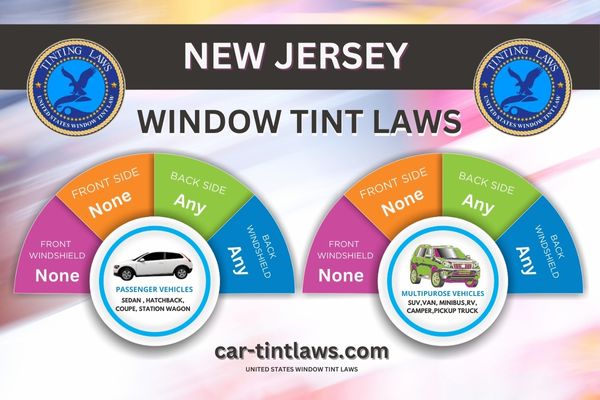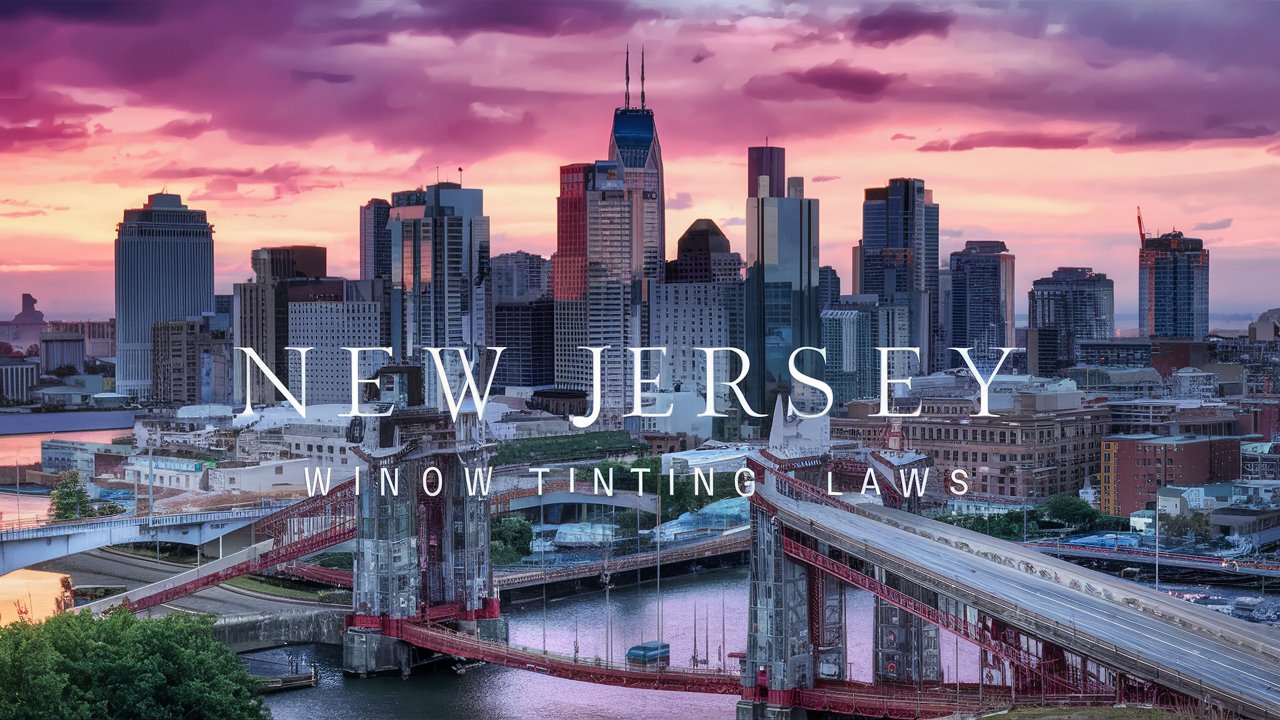Did you know that New Jersey’s window tinting laws are among the strictest in the country?
If you’re considering tinting your car windows, it’s essential to understand these regulations to avoid hefty fines.
For instance, sedans can’t have any tint on the windshield and front side windows, while SUVs and vans are allowed some flexibility.
Mirrored or metallic tints are off-limits for certain windows, and there are even provisions for medical exemptions.
Curious about how these laws might impact your vehicle customization plans or what fines you could face for non-compliance? Let’s explore further.
Window Tint Darkness in New Jersey
When it comes to tint darkness in New Jersey, the rules differ between sedans and SUVs or vans.
For sedans, no tint is allowed on the windshield and front side windows, while any darkness can be used on the back side windows and rear window.
Likewise, SUVs and vans can’t have tint on the windshield and front side windows, but you can use any darkness on the back side windows and rear window.
Tint darkness for sedans:
Adhering to New Jersey’s window tinting laws for sedans is crucial to avoid penalties and ensure your vehicle is road-legal.
In New Jersey, the tint darkness restrictions for sedans are detailed as follows:
- Windshield: No tint is allowed on the windshield.
- Front Side windows: No tint can be applied legally to this window.
- Back Side windows: Any darkness can be applied.
- Rear Window: Any darkness can be applied.
Comprehending these tint darkness regulations is essential to uphold visibility and safety standards for drivers and passengers while allowing some personalization.
By adhering to the VLT requirements and keeping the front side windows clear, you can steer clear of fines and ensure your sedan meets New Jersey’s legal criteria.
Always verify that your tinting aligns with these guidelines to maintain safety and adherence to regulations.
Tint darkness for SUV and Vans:
- Windshield: No tint is allowed on the windshield.
- Front Side windows: No tint can be applied legally to this window.
- Back Side windows: Any darkness can be used.
- Rear Window: Any darkness can be used.
Window Tint Reflection in New Jersey
When tinting your vehicle’s windows in New Jersey, it’s important to understand the specific regulations regarding reflection.
For sedans, as well as SUVs and vans, the tint cannot have a mirrored or metallic appearance on both front and back side windows.
This restriction guarantees that glare and heat are reduced within legal limits, maintaining safety and visibility on the road.
Tint reflection for sedans:
- Front Side windows: Mirrored or metallic tint is prohibited.
- Back Side windows: Mirrored or metallic tint is prohibited.
Tint reflection for SUV and vans:
- Front Side windows: Must not have a mirrored or metallic appearance.
- Back Side windows: Must not have a mirrored or metallic appearance.
Other New Jersey window tint rules and regulations
- Side Mirrors: No restrictions.
- Restricted Colors: In New Jersey, all tint colors are permitted.
- Certificates: There are no requirements for manufacturers to certify window tint film in New Jersey.
- Stickers: Stickers to identify legal tints are not mandatory in New Jersey.
- Medical Exceptions: New Jersey allows for medical exemptions for special window tint. To learn more about the specific terms of the exemption, refer to New Jersey state law.
- Penalties: Violations of window tint laws in New Jersey can result in fines. It is important to adhere to these regulations to avoid tickets.

Medical Exemptions for Window Tint Rules in New Jersey
Physicians can confirm specific medical conditions, like polymorphous eruption, that qualify for special window tint exemptions in New Jersey.
If you have a qualifying condition, the state’s window tint laws allow for a medical exemption, which permits you to use tint with a lower VLT (Visible Light Transmission) than normally permitted.
To apply for MVC Sunscreening, you’ll need a physician’s confirmation detailing your medical condition and the necessity for the tint.
The application process for medical exemptions involves submitting the appropriate forms, and you’ll need to make sure that the sun-screening materials you use are transparent films.
Installation must be carried out by a licensed facility to comply with the regulations.
Remember, the approval for your sun-screening exemption isn’t permanent.
You must renew it every 48 months, following the guidelines set by the New Jersey Motor Vehicle Commission (MVC).
It’s important to adhere to these medical exemption guidelines, as failure to comply can result in fines and legal consequences.
Understanding and following the rules ensures you’re protected under the law, while also maintaining safety on the road.
Always keep your documentation up-to-date and verify all installations meet the state’s requirements.
New Jersey Window Tint Ticket Cost
Getting ticketed for illegal window tint in New Jersey can lead to a hefty fine, with the first offense potentially costing you up to $1,000.
The state’s enforcement of window tint laws is strict, and subsequent offenses may result in fines of up to $5,000.
It’s important to understand and follow New Jersey’s tinting laws to avoid such penalties.
New Jersey’s window tint regulations are designed to guarantee safety and visibility for all drivers.
Violating these regulations can result in inspection issues and reduced visibility, which poses risks not only for you but also for other road users.
Law enforcement officers are vigilant, frequently checking for illegal tint during routine traffic stops and inspections.
The high ticket cost for illegal window tint is intended to deter drivers from using tints that are too dark or otherwise non-compliant with state laws.
Ensuring that your vehicle’s window tint adheres to New Jersey’s standards can save you from these significant fines and help maintain road safety.
New Jersey Traffic Regulations
When considering New Jersey traffic regulations, you’ve got to understand the legal tint limits, reflectivity restrictions, and medical exemptions.
These regulations dictate that windshields and front side windows can’t have any tint, while rear side and rear windows allow any darkness level.
For those with medical conditions, the state offers exemptions, provided you have proper documentation.
Legal Tint Limits
In New Jersey, traffic regulations mandate that the front windshield and front side windows must maintain a Visible Light Transmission (VLT) of at least 70%.
This means your car’s windows need to allow 70% of light to pass through.
This rule is essential to make sure that drivers have a clear view of the road, promoting safety for everyone.
When it comes to the rear side windows and the rear window, these can be tinted darker.
However, they still need to comply with the state’s legal tint limits.
Adhering to these limits not only guarantees safety but also reduces glare and helps with car cooling, making your driving experience more comfortable.
If you have a medical condition that requires darker window tints, you may qualify for a medical exemption.
This allows you to have tints that would otherwise exceed the legal limits.
However, it’s important to obtain proper documentation to avoid any legal issues.
Violating New Jersey’s tint laws can result in fines, inspection problems, and reduced visibility, which can be risky.
Staying within the legal tint limits helps you avoid penalties and ensures that you and others on the road remain safe.
Reflectivity Restrictions
Reflectivity restrictions in New Jersey prohibit any mirrored or metallic appearance on the front and back side windows of sedans, SUVs, and vans.
These regulations are designed to guarantee that drivers maintain maximum visibility and prevent excessive glare, which can be hazardous on the road.
When you tint your vehicle’s windows, it’s important to adhere to these rules to stay in compliance with New Jersey’s traffic regulations.
The front and back side windows of your sedan, SUV, or van should not have any tint that reflects light in a way that creates a mirrored or metallic look.
This means you need to choose a window tint that does not exceed these reflectivity restrictions. By doing so, you not only secure your safety but also the safety of other road users.
Understanding and following these guidelines can help you avoid penalties and legal issues related to improper window tinting.
New Jersey takes these reflectivity restrictions seriously, and non-compliance could result in fines or the need to remove the tint.
Staying informed about these rules and guaranteeing your vehicle’s windows meet the standards is essential for maintaining compliance and promoting safe driving conditions.
Medical Exemptions
For those with certain medical conditions, New Jersey allows for exemptions to its window tinting laws.
If you have a condition like polymorphous eruption, you might qualify for a medical exemption.
To get this exemption, you’ll need a physician’s confirmation detailing your need for special window tinting.
The Vehicle Light Transmission (VLT) percentages, which indicate how much light can pass through your windows, will be specified by your physician based on your condition.
The sun-screening materials you use must be a transparent film to meet the medical exemption criteria.
This guarantees that while the tint protects you, it doesn’t impair visibility for safe driving.
The application process involves submitting specific forms to the New Jersey Motor Vehicle Commission (MVC).
You’ll need to follow their guidelines carefully to verify your application is approved.
Once granted, the medical exemption is valid for 48 months and must be renewed periodically.
This means you’ll need to keep track of the renewal date and verify all documentation is up-to-date to maintain your exemption.
By following these steps, you can ensure adherence to New Jersey’s traffic regulations while addressing your medical needs.
New Jersey Motor Vehicle Commission – Window sun-screening for medical reasons
New Jersey Motor Vehicle Commission – Medical exemption application form (.pdf file)
References
New Jersey Laws – Title 13, Chapter 20, Subchapter 1 – Types of sunscreening materials and products
Frequently Asked Questions
What Is the Darkest Legal Tint in Nj?
You’re wondering about the darkest legal tint in NJ? It’s 70% VLT for front and rear windows.
This tint darkness addresses visibility concerns, legal limits, and enforcement issues, ensuring safety implications aren’t overlooked. Stay compliant!
Will I Get Pulled Over for 20 Tint in Nj?
Even if you think you’ll be fine, you might get pulled over for 20% tint.
Police discretion plays a big role, and you could face tinting fines, removal demands, or miss legal exceptions.
Tint visibility matters.
Is 30% Tint Legal in Nj?
You’re asking about 30% tint, right? It’s not within the legal limits for front side windows.
Safety concerns and cost factors aside, the installation process risks fines. Stick to the legal tint percentage to avoid trouble.
Does NJ Fail Inspection for Tinted Windows?
Like a hawk eyeing its prey, NJ inspection requirements are strict.
If your tinted window visibility doesn’t meet standards, expect penalties for violations.
You might need a tint removal process, affecting vehicle resale value substantially.
Conclusion
Understanding and following New Jersey’s window tinting laws is crucial to dodge substantial fines and potential inspection problems.
Sedans are not allowed to have any tint on the windshield and front side windows, while SUVs and vans can tint the back side and rear windows.
Mirrored or metallic tints are not allowed, and medical exemptions necessitate specific conditions and licensed installations.
By adhering to these regulations, you guarantee compliance and steer clear of the significant inconvenience of legal complications.
